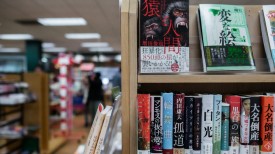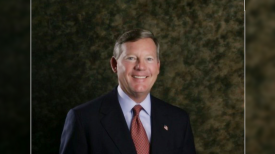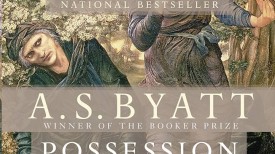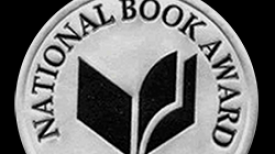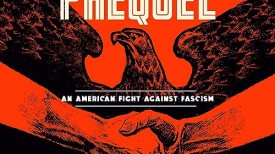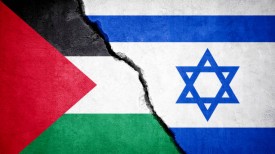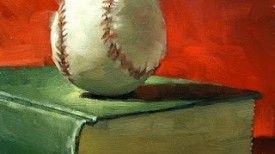Author Claire Vaye Watkins Wins Two Major Literary Awards for New Novel
Author Claire Vaye Watkins was announced as the recipient of two major literary awards for her new novel "Battleborn".
Author Claire Vaye Watkins has just released her debut collection "Battleborn" and it has already fetched two major literary awards. On Wednesday it was announced that the author was the recipient of the $10,000 Rosenthal Family Foundation Award from the American Academy of Arts and Letters, and the $20,000 Story Prize. The Story Prize is the most prestigious award for short story fiction in the U.S.
Speaking to Fresh Air's Dave Davies, the author talks about her book, her father and childhood:
On how they would pass the hours driving to the grocery store and back through the Nevada desert
"My mom especially was a terrific BS-er. She told tons of stories, especially because where we lived was so remote, was so far away. We [had] to drive - when I was really young, before southern Nevada kind of exploded in population - we had to drive for maybe two-and-a-half hours to go to the grocery store. Really we had to drive ... to Las Vegas and back to get groceries or hardware or really anything you needed, so my mom would often, she would talk the entire trip, and what she would tell us were stories about what we were seeing. She was sort of an amateur geologist and natural historian, and she would tell us all about how a certain mountain range was formed or how everything we were seeing was once under the ocean ... and so there were her stories.
"And then there were also - my mom and my dad and then later my stepdad, they were in recovery, they were recovering alcoholics - and so AA was a big part of our lives, and on these trips we would either be talking to each other and telling stories or listening to these tapes, these AA tapes, these speaker tapes where people tell their stories about how they hit rock bottom and how they got sober and sort of what they've learned, and you can imagine those are pretty gritty stories."
On her father, Paul Watkins, and his 1979 memoir My Life with Charles Manson
"For me, having not really known my dad at all - he died when I was so young - that I had never really had access to an entire dimension to him. ... I'd never really had access to his flaws or his mistakes. You know, no one really says to a kid, 'Your dad was a decent man, but he did some shady stuff. He lured young girls to the Manson family, where they were tremendously exploited.' That wasn't a narrative that was available to me from my family members, and rightfully so. I don't resent them that. But the book and the Manson materials gave me this whole other dimension to him, and it made him more real than he'd ever been."
On fitting the prospecting history of the West into her stories
"You can't really write a book about ... the West without the gold rush, because without the gold rush you wouldn't have had the silver rush, and without the silver rush we would probably just still have a Nevada-shaped hole in our country, because Nevada would be of no interest to anyone, likely. Maybe we would start blowing up nuclear weapons in it eventually, but it would have taken a lot longer. ... In a way, we haven't really gotten over the gold rush, which was a lie even when it was happening, and that kind of instability of history is something that has always really fascinated me. A lot of the characters are, you know, kind of internalizing this John Wayne masculinity, this mythic, rugged individual, and really suffering for it."
On writing the book in the wake of her mother's death and leaving the West for the first time
"I don't want to romanticize the experiences of people who are living in rural communities or poor communities - which Pahrump is - or the desert. Our dominant cultural narrative totally devalues all three of those things: rural, poor and desert."
"I always say I exist in a constant state of homesickness, and that's really the context in which I wrote this book, too. You know, I wrote it five months after my mom committed suicide and about three months after leaving the West for the first time to go study [at graduate school] in Ohio, and there was this landscape of grief and homesickness. I'd never written a word about Nevada until then, and I think suddenly being removed from my home and missing, you know, the mountains and the stars and the dry air and the rocks and the spiny plants, just this tremendous, overwhelming homesickness, which surely had to do with my mom's dying, I guess I kind of felt the need to conjure up Nevada and bring it back to me that way."
On whether she would want to raise her future family in the West
"I have such tremendous affection for the West that I would want anyone I loved to experience it and to see it and to spend as much time there as possible. I think I would definitely want that experience for my family, but it's also not entirely a romantic [place] to grow up. I don't want to romanticize the experiences of people who are living in rural communities or poor communities - which Pahrump is - or the desert. Our dominant cultural narrative totally devalues all three of those things: rural, poor and desert. There was the sense when I was there, you're often told that where you are is not valuable or important. Just think about the way we talk about the desert as a 'wasteland' or 'the middle of nowhere' or it's 'barren.' That's a really bizarre phenomenon when you've spent your whole life in a place and then the culture tells you it actually doesn't even exist, and if it does exist it's worthless. That's a bit of a heady place to be, and that's partly what I was looking for with this book, was getting a portrait of the place that had never before been presented to me."
© 2023 Books & Review All rights reserved.
Popular Now
1
Books to Read After 'Fourth Wing': Top Picks for Fantasy and Romantasy Fans

2
‘The Secret Public’ by Jon Savage Book Review: An Insightful Look Into the LGBTQ Influence

3
Stephanie Regalado's 'If They Only Knew' Column Is Now A Book, Unleashing 60 Anonymous True Stories to Empower Women

4
'No Wire Hangers' Scene That Almost Did Not Happen: New Book Reveals Faye Dunaway's Struggles

5
Rare First Edition of Aphra Behn's Novel 'Oroonoko' Discovered in Kent: A Historic Literary Find

Latest Stories
Book Reviews
‘The Secret Public’ by Jon Savage Book Review: An Insightful Look Into the LGBTQ Influence

Book News
Stephanie Regalado's 'If They Only Knew' Column Is Now A Book, Unleashing 60 Anonymous True Stories to Empower Women

Book News
'No Wire Hangers' Scene That Almost Did Not Happen: New Book Reveals Faye Dunaway's Struggles

Book Reviews
‘The Perfect Couple’ by Elin Hilderbrand Book Review: A Captivating Summer Mystery

Book News
New Book ‘The Franchise’ Reveals Penguins President Kyle Dubas’ ‘Biggest Mistake’ as Maple Leafs GM

